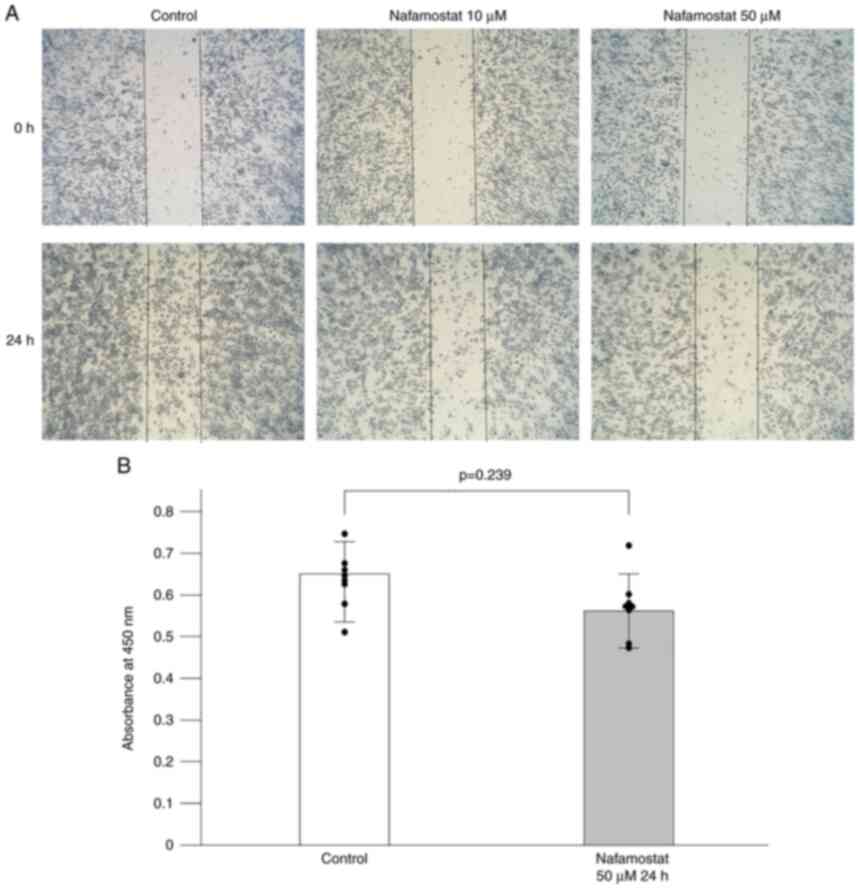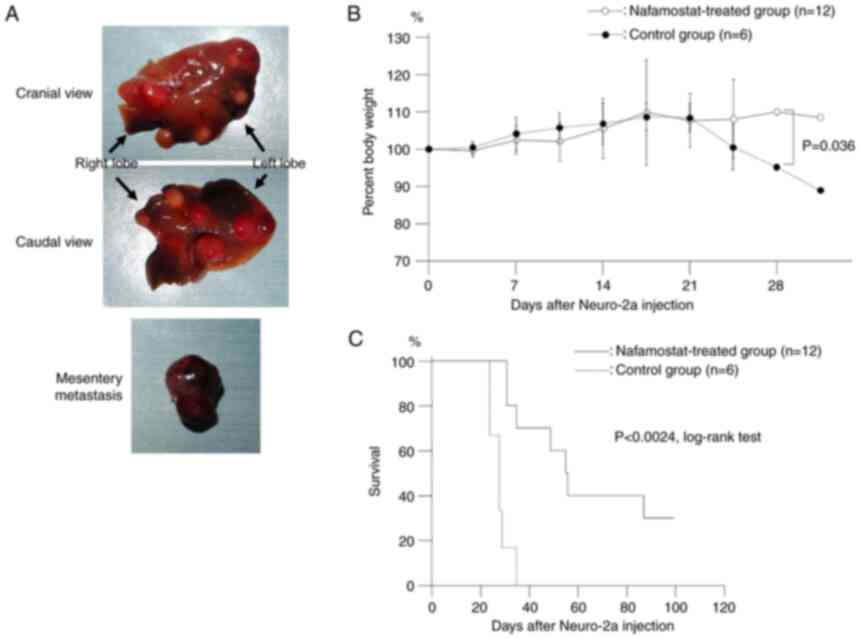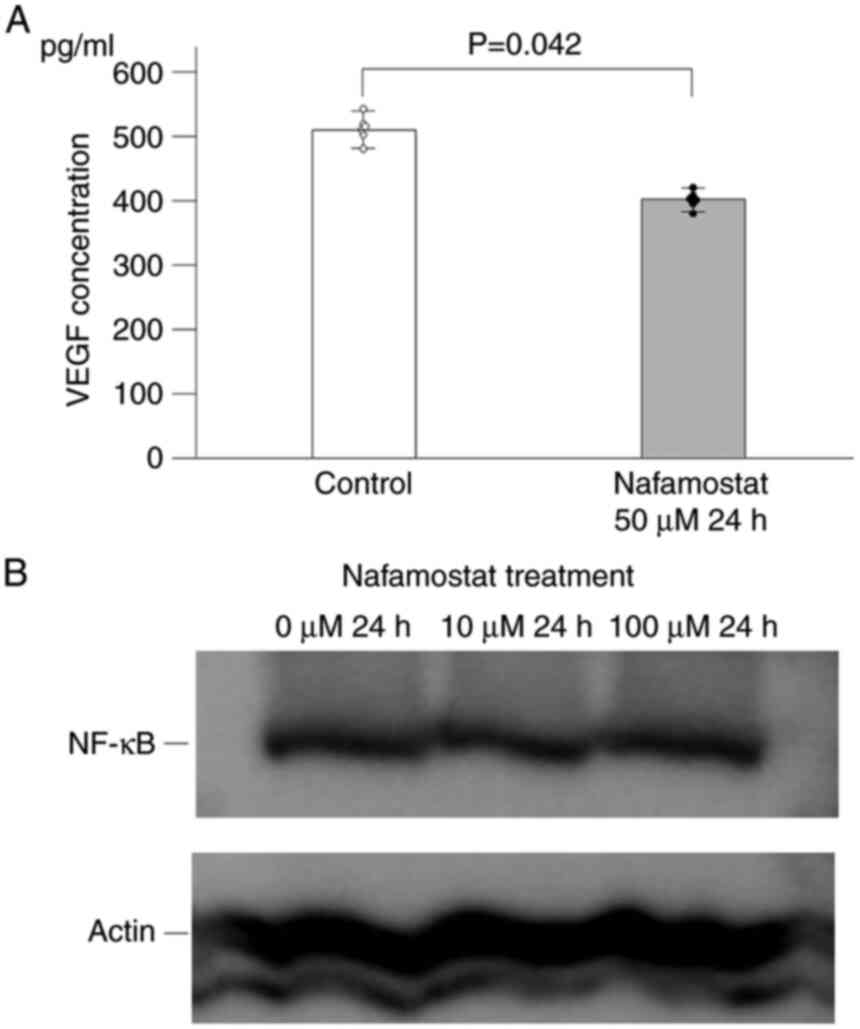|
1
|
Matthay KK, Maris JM, Schleiermacher G,
Nakagawara A, Mackall CL, Diller L and Weiss WA: Neuroblastoma. Nat
Rev Dis Primers. 2(16078)2016.PubMed/NCBI View Article : Google Scholar
|
|
2
|
Shankar V, Hori H, Kihira K, Lei Q, Toyoda
H, Iwamoto S and Komada Y: Mesenchymal stromal cell secretome
up-regulates 47 kDa CXCR4 expression, and induce invasiveness in
neuroblastoma cell lines. PLoS One. 10(e0120069)2015.PubMed/NCBI View Article : Google Scholar
|
|
3
|
Matthay KK: Chemotherapy for
neuroblastoma: Does it hit the target? Lancet Oncol. 9:195–196.
2008.PubMed/NCBI View Article : Google Scholar
|
|
4
|
Guan X: Cancer metastases: Challenges and
opportunities. Acta Pharm Sin B. 5:402–418. 2015.PubMed/NCBI View Article : Google Scholar
|
|
5
|
Joyce JA and Pollard JW:
Microenvironmental regulation of metastasis. Nat Rev Cancer.
9:239–252. 2009.PubMed/NCBI View
Article : Google Scholar
|
|
6
|
Carmeliet P and Jain RK: Molecular
mechanisms and clinical applications of angiogenesis. Nature.
473:298–307. 2011.PubMed/NCBI View Article : Google Scholar
|
|
7
|
Iwashita K, Kitamura K, Narikiyo T, Adachi
M, Shiraishi N, Miyoshi T, Nagano J, Tuyen DG, Nonoguchi H and
Tomita K: Inhibition of prostasin secretion by serine protease
inhibitors in the kidney. J Am Soc Nephrol. 14:11–16.
2003.PubMed/NCBI View Article : Google Scholar
|
|
8
|
Fujiwara Y, Furukawa K, Haruki K, Shimada
Y, Iida T, Shiba H, Uwagawa T, Ohashi T and Yanaga K: Nafamostat
mesilate can prevent adhesion, invasion and peritoneal
dissemination of pancreatic cancer thorough nuclear factor kappa-B
inhibition. J Hepatobiliary Pancreat Sci. 18:731–739.
2011.PubMed/NCBI View Article : Google Scholar
|
|
9
|
Kimura T, Fuchimoto S, Iwagaki H, Hizuta A
and Orita K: Inhibitory effect of nafamostat mesilate on metastasis
into the livers of mice and on invasion of the extracellular matrix
by cancer cells. J Int Med Res. 20:343–352. 1992.PubMed/NCBI View Article : Google Scholar
|
|
10
|
Lu YX, Ju HQ, Wang F, Chen LZ, Wu QN,
Sheng H, Mo HY, Pan ZZ, Xie D, Kang TB, et al: Inhibition of the
NF-κB pathway by nafamostat mesilate suppresses colorectal cancer
growth and metastasis. Cancer Lett. 380:87–97. 2016.PubMed/NCBI View Article : Google Scholar
|
|
11
|
Mander S, You DJ, Park S, Kim DH, Yong HJ,
Kim DS, Ahn C, Kim YH, Seong JY and Hwang JI: Nafamostat mesilate
negatively regulates the metastasis of triple-negative breast
cancer cells. Arch Pharm Res. 41:229–242. 2018.PubMed/NCBI View Article : Google Scholar
|
|
12
|
Saito N, Uwagawa T, Hamura R, Takada N,
Sugano H, Shirai Y, Shiba H, Ohashi T and Yanaga K: Prevention of
early liver metastasis after pancreatectomy by perioperative
administration of a nuclear factor-κB inhibitor in mice. Surgery.
166:991–996. 2019.PubMed/NCBI View Article : Google Scholar
|
|
13
|
Uwagawa T, Misawa T, Tsutsui N, Ito R,
Gocho T, Hirohara S, Sadaoka S and Yanaga K: Phase II study of
gemcitabine in combination with regional arterial infusion of
nafamostat mesilate for advanced pancreatic cancer. Am J Clin
Oncol. 36:44–48. 2013.PubMed/NCBI View Article : Google Scholar
|
|
14
|
Yamashita Y, Ishiguro Y, Sano D, Kimura M,
Fujita K, Yoshida T, Horiuchi C, Taguchi T, Matsuda H, Mikami Y and
Tsukuda M: Antitumor effects of Nafamostat mesilate on head and
neck squamous cell carcinoma. Auris Nasus Larynx. 34:487–491.
2007.PubMed/NCBI View Article : Google Scholar
|
|
15
|
Shan D, Chen L, Njardarson JT, Gaul C, Ma
X, Danishefsky SJ and Huang XY: Synthetic analogues of migrastatin
that inhibit mammary tumor metastasis in mice. Proc Natl Acad Sci
USA. 102:3772–3776. 2005.PubMed/NCBI View Article : Google Scholar
|
|
16
|
Qi L, Toyoda H, Shankar V, Sakurai N,
Amano K, Kihira K, Iwasa T, Deguchi T, Hori H, Azuma E, et al:
Heterogeneity of neuroblastoma cell lines in insulin-like growth
factor 1 receptor/Akt pathway-mediated cell proliferative
responses. Cancer Sci. 104:1162–1171. 2013.PubMed/NCBI View Article : Google Scholar
|
|
17
|
Toyoda H, Wimmer E and Cello J: Oncolytic
poliovirus therapy and immunization with poliovirus-infected cell
lysate induces potent antitumor immunity against neuroblastoma in
vivo. Int J Oncol. 38:81–87. 2011.PubMed/NCBI
|
|
18
|
Yu JL, Chan S, Fung MK and Chan GC:
Mesenchymal stem cells accelerated growth and metastasis of
neuroblastoma and preferentially homed towards both primary and
metastatic loci in orthotopic neuroblastoma model. BMC Cancer.
21(393)2021.PubMed/NCBI View Article : Google Scholar
|
|
19
|
Toyoda H, Ido M, Hayashi T, Gabazza EC,
Suzuki K, Kisenge RR, Kang J, Hori H and Komada Y: Experimental
treatment of human neuroblastoma using live-attenuated poliovirus.
Int J Oncol. 24:49–58. 2004.PubMed/NCBI
|
|
20
|
Kitchen P, Salman MM, Halsey AM,
Clarke-Bland C, MacDonald JA, Ishida H, Vogel HJ, Almutiri S, Logan
A, Kreida S, et al: Targeting aquaporin-4 subcellular localization
to treat central nervous system edema. Cell. 181:784–799.e19.
2020.PubMed/NCBI View Article : Google Scholar
|
|
21
|
Sylvain NJ, Salman MM, Pushie MJ, Hou H,
Meher V, Herlo R, Peeling L and Kelly ME: The effects of
trifluoperazine on brain edema, aquaporin-4 expression and
metabolic markers during the acute phase of stroke using
photothrombotic mouse model. Biochim Biophys Acta Biomembr.
1863(183573)2021.PubMed/NCBI View Article : Google Scholar
|
|
22
|
Markou A, Unger L, Abir-Awan M, Saadallah
A, Halsey A, Balklava Z, Conner M, Törnroth-Horsefield S, Greenhill
SD, Conner A, et al: Molecular mechanisms governing aquaporin
relocalisation. Biochim Biophys Acta Biomembr.
1864(183853)2022.PubMed/NCBI View Article : Google Scholar
|
|
23
|
Salman MM, Kitchen P, Yool AJ and Bill RM:
Recent breakthroughs and future directions in drugging aquaporins.
Trends Pharmacol Sci. 43:30–42. 2022.PubMed/NCBI View Article : Google Scholar
|
|
24
|
Wagner K, Unger L, Salman MM, Kitchen P,
Bill RM and Yool AJ: Signaling mechanisms and pharmacological
modulators governing diverse aquaporin functions in human health
and disease. Int J Mol Sci. 23(1388)2022.PubMed/NCBI View Article : Google Scholar
|
|
25
|
Cao X, Geradts J, Dewhirst MW and Lo HW:
Upregulation of VEGF-A and CD24 gene expression by the tGLI1
transcription factor contributes to the aggressive behavior of
breast cancer cells. Oncogene. 31:104–115. 2012.PubMed/NCBI View Article : Google Scholar
|
|
26
|
Fallah J and Rini BI: HIF Inhibitors:
Status of current clinical development. Curr Oncol Rep.
21(6)2019.PubMed/NCBI View Article : Google Scholar
|
|
27
|
Su F, Geng J, Li X, Qiao C, Luo L, Feng J,
Dong X and Lv M: SP1 promotes tumor angiogenesis and invasion by
activating VEGF expression in an acquired trastuzumab-resistant
ovarian cancer model. Oncol Rep. 38:2677–2684. 2017.PubMed/NCBI View Article : Google Scholar
|
|
28
|
Wei D, Le X, Zheng L, Wang L, Frey JA, Gao
AC, Peng Z, Huang S, Xiong HQ, Abbruzzese JL and Xie K: Stat3
activation regulates the expression of vascular endothelial growth
factor and human pancreatic cancer angiogenesis and metastasis.
Oncogene. 22:319–329. 2003.PubMed/NCBI View Article : Google Scholar
|
|
29
|
Raimondi I, Izzo L, Tunesi M, Comar M,
Albani D and Giordano C: Organ-On-A-Chip in vitro models of the
brain and the blood-brain barrier and their value to study the
microbiota-gut-brain axis in neurodegeneration. Front Bioeng
Biotechnol. 7(435)2020.PubMed/NCBI View Article : Google Scholar
|
|
30
|
Salman MM, Marsh G, Kusters I, Delince M,
Di Caprio G, Upadhyayula S, de Nola G, Hunt R, Ohashi KG, Gray T,
et al: Design and validation of a human brain endothelial
microvessel-on-a-chip open microfluidic model enabling advanced
optical imaging. Front Bioeng Biotechnol. 8(573775)2020.PubMed/NCBI View Article : Google Scholar
|
|
31
|
Aldewachi H, Al-Zidan RN, Conner MT and
Salman MM: High-Throughput screening platforms in the discovery of
novel drugs for neurodegenerative diseases. Bioengineering (Basel).
8(30)2021.PubMed/NCBI View Article : Google Scholar
|
|
32
|
Salman MM, Al-Obaidi Z, Kitchen P, Loreto
A, Bill RM and Wade-Martins R: Advances in applying computer-aided
drug design for neurodegenerative diseases. Int J Mol Sci.
22(4688)2021.PubMed/NCBI View Article : Google Scholar
|

















